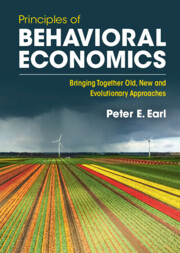Book contents
- Principles of Behavioral Economics
- Principles of Behavioral Economics
- Copyright page
- Contents
- Figures
- Tables
- Preface
- Acknowledgments
- 1 What Is Behavioral Economics?
- 2 What Motivates Us?
- 3 Why Is Life So Full of Problems for Us to Try to Solve?
- 4 How Do We Acknowledge Problems and Assess Options?
- 5 How Do We Deal with Uncertainty and Ambiguity?
- 6 How Do We Search for Solutions to Problems?
- 7 Why Do Some Things Matter More Than Others?
- 8 How Do We Choose?
- 9 How Can Firms and Governments Influence Our Choices?
- 10 What Determines the Productivity of an Organization?
- 11 How Does the Competitive Process Work?
- 12 Are There Any Behavioral Insights for Macroeconomists?
- 13 Can We Be Happy without Destroying the Environment?
- References
- Index
12 - Are There Any Behavioral Insights for Macroeconomists?
Published online by Cambridge University Press: 18 October 2022
- Principles of Behavioral Economics
- Principles of Behavioral Economics
- Copyright page
- Contents
- Figures
- Tables
- Preface
- Acknowledgments
- 1 What Is Behavioral Economics?
- 2 What Motivates Us?
- 3 Why Is Life So Full of Problems for Us to Try to Solve?
- 4 How Do We Acknowledge Problems and Assess Options?
- 5 How Do We Deal with Uncertainty and Ambiguity?
- 6 How Do We Search for Solutions to Problems?
- 7 Why Do Some Things Matter More Than Others?
- 8 How Do We Choose?
- 9 How Can Firms and Governments Influence Our Choices?
- 10 What Determines the Productivity of an Organization?
- 11 How Does the Competitive Process Work?
- 12 Are There Any Behavioral Insights for Macroeconomists?
- 13 Can We Be Happy without Destroying the Environment?
- References
- Index
Summary
This chapter begins by noting the key ingredients in Akerlof and Shiller’s bestseller Animal Spirits but goes on to cover a far wider range of macroeconomics issues, including a detailed coverage of Minsky’s “financial instability hypothesis” that prefigures their work. After examining alternative theories of how speculative markets work and discussing herding behavior via both information and decision rule cascades, the chapter considers Keynesian view of animal spirits in relation to liquidity preference, leading to a discussion of Katana’s work on the impact of consumer confidence on discretionary spending. Next comes analysis of saving behavior in relation to innovative mortgage products and the impact of evolving bank lending rules on housing affordability. After considering Minsky’s work, material from earlier chapters is used to provide new perspectives on involuntary unemployment, inflation, exchange rate determination and the importance of non-price factors in the determination of international trade (with a discussion of the limited ways in which exchange rates shape trade). Finally, behavioral analysis of decision-making is applied to the making of macroeconomic policy.
Keywords
- Type
- Chapter
- Information
- Principles of Behavioral EconomicsBringing Together Old, New and Evolutionary Approaches, pp. 388 - 429Publisher: Cambridge University PressPrint publication year: 2022

